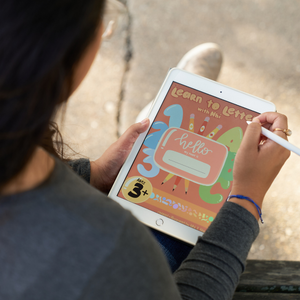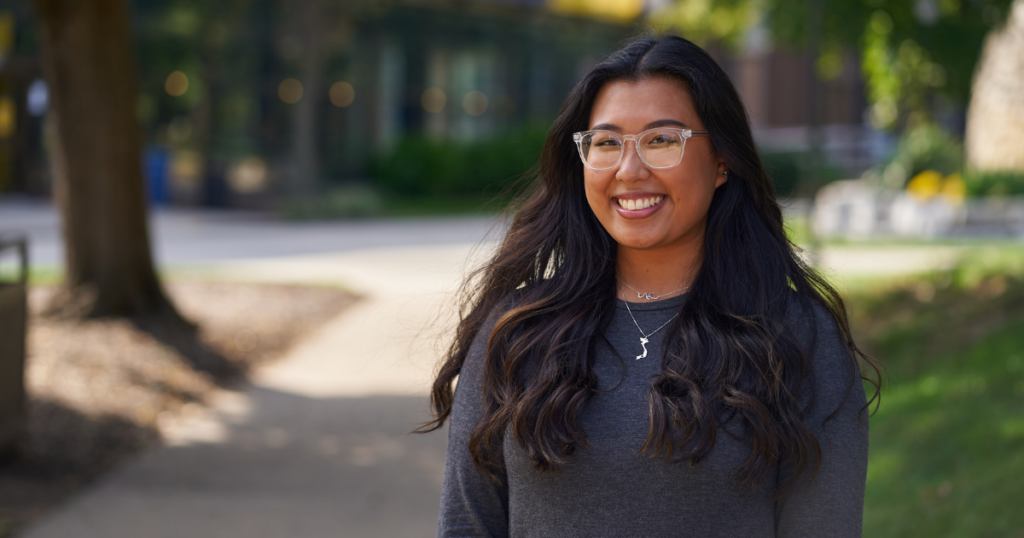La Salle University
The write stuff
Biology major Nhi Nguyen, ’22, authored a handwriting workbook for children that’s focused on creating better educational outcomes.
Writing your name defines who you are. That seems intuitive, right? As we learn to write, we use intersecting vertical, horizontal, and swooping lines to make up letters that comprise our identity.
Writing your name is also an academic cornerstone, one of the first lessons for any child, that allows them to place their mark on schoolwork or artwork. And for Nhi Nguyen, ’22, it represents the bridge to better educational experiences and outcomes.
In August, Nguyen authored, illustrated, and published a children’s handwriting workbook aimed at teaching prewriting strokes and encouraging proper form on capital and lowercase letters, numbers, and more. “Hello, My Name Is” promotes visual memory and bilateral coordination, assists with school readiness, and reinforces knowledge, while improving handwriting.

Nguyen, a biology major at La Salle University, did not have to look beyond her personal experiences to find inspiration for writing “Hello, My Name Is.”
“Writing was a challenge for me, and that’s part of my motivation for writing the workbook and wanting to become an occupational therapist,” said Nguyen, a Northeast Philadelphia native. “I would have benefited from OT services as a kid. I hold my pen in an unconventional way and it hinders me from writing for long periods of time. Is it functional? Yes, but it’s not the standard tripod grip.”
Occupational therapists, or OTs, are healthcare practitioners who work with people across all ages, and through various injuries, illnesses, and disabilities, to encourage, promote, and improve their function in daily activities.
An intervention into a child’s physical and motor skills to grasp a pen or improve hand-eye coordination (or visual-motor integration) is one example, Nguyen said. Her 132-page workbook marries functional relevance with colorful illustrations, pictures, and shapes to keep a child engaged and stimulated while they are learning. Nguyen has participated in pre-professional shadowing experiences with occupational therapists and their clients. She noted, in these settings, that the handwriting workbooks currently in print lacked input from therapists who specialize in early-intervention care.
“Handwriting is the start of a child’s education,” Nguyen said. “The book is for children who are learning through disability or injury, and those who need help with executive functioning. As I enter into the professional phase of my career, I want to share what an OT can do while also supporting children in this way.”
Another motivating factor for writing her handbook? La Salle’s Neighborhood Tutoring program, she said.
“Handwriting is the start of a child’s education. My book is for children who are learning through disability or injury, and those who need help with executive functioning. As I enter into the professional phase of my career, I want to share what an occupational therapist can do while also supporting children in this way.”
“Through Neighborhood Tutoring, I came to value education even more,” Nguyen said. “We would tutor children from the area surrounding La Salle, and they would invite family members from elsewhere in the city, and the program exposed me to differences in the needs and learning potential of students from throughout Philadelphia. It’s through service at La Salle that pushed me to consider writing the book and looking inwardly at myself and considering my next steps.”
Nguyen, who is minoring in religion and theology and interpersonal communication, is a recipient of La Salle’s Community Service Scholarship. Throughout her career at La Salle, she has maintained active involvement and leadership in the University’s service functions and community since her arrival to 20th and Olney.
“When someone receives that scholarship, it’s in recognition of their service work before enrolling at La Salle, and their capacity for leadership, advocacy, social justice work,” said La Salle’s Director of University Ministry Regina Gauss Kosiek, in the Office of University Ministry, Service, and Support. “I remember first meeting Nhi and being immediately impressed. She is so clear-headed, so mature. She’s a steady force.”
After publishing “Hello, My Name Is” in August, Nguyen initially shared the workbook with OTs who were listed in its acknowledgements section. She figured it might help bridge gaps in treatment plans for their clients. Family members began circulating it to friends, neighbors, and teachers, expanding its reach. It’s also available on Amazon, Etsy, and Teachers Pay Teachers.

Nguyen is set to graduate from La Salle in May. Next, she will pursue a doctorate in occupational therapy, with a focus on research in assistive technology, policy, and procedure—with future editions of “Hello, My Name Is” to follow.
“I always wanted to attend college. I felt a responsibility to set an example for my cousins and siblings,” said Nguyen, a first-generation American and first-generation college student. “My parents did not finish school in Vietnam. They did not have the same opportunities I had. My family is big on education, faith and family values.”
“I would not have my education opportunities today if not for my family,” she added. “It’s my hope this book can continue to make a difference in the lives of children and their families for many years.”
—Christopher A. Vito
